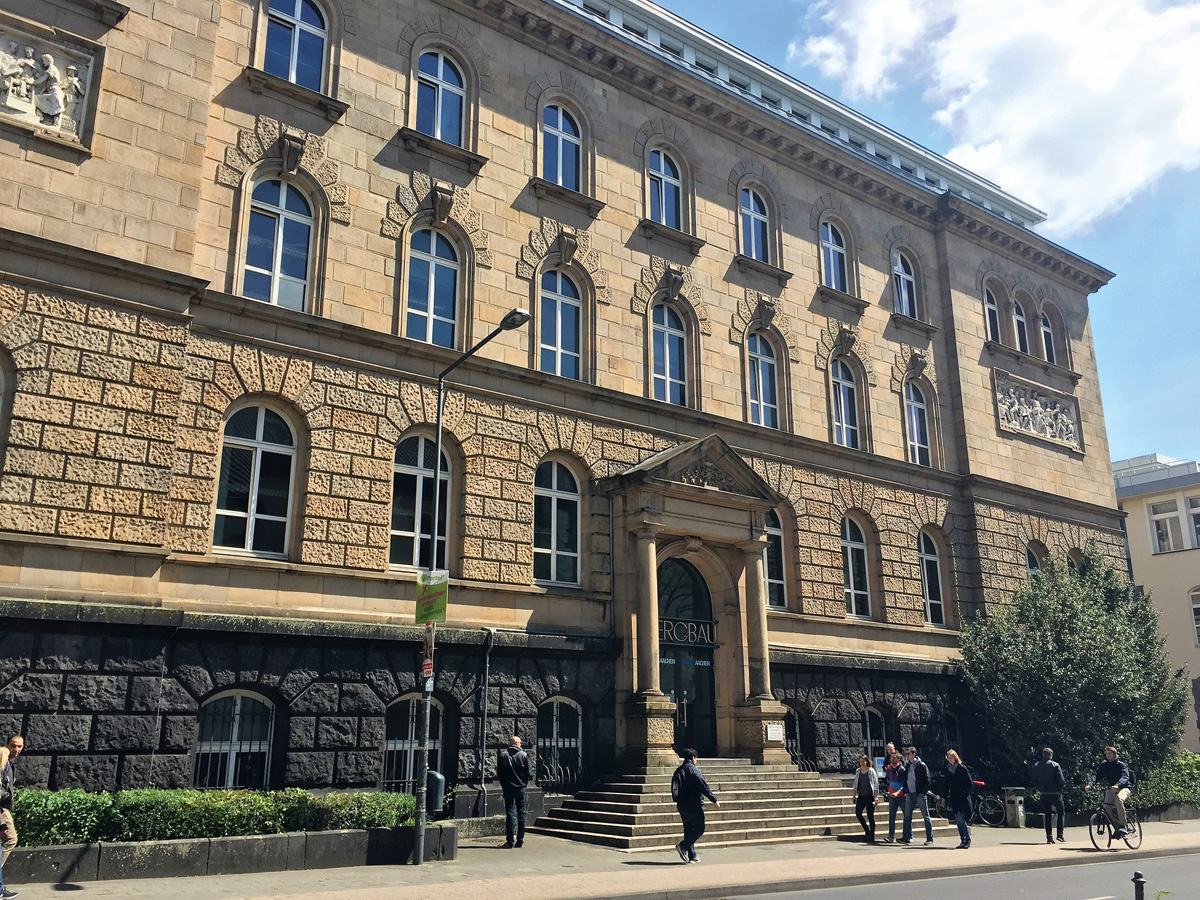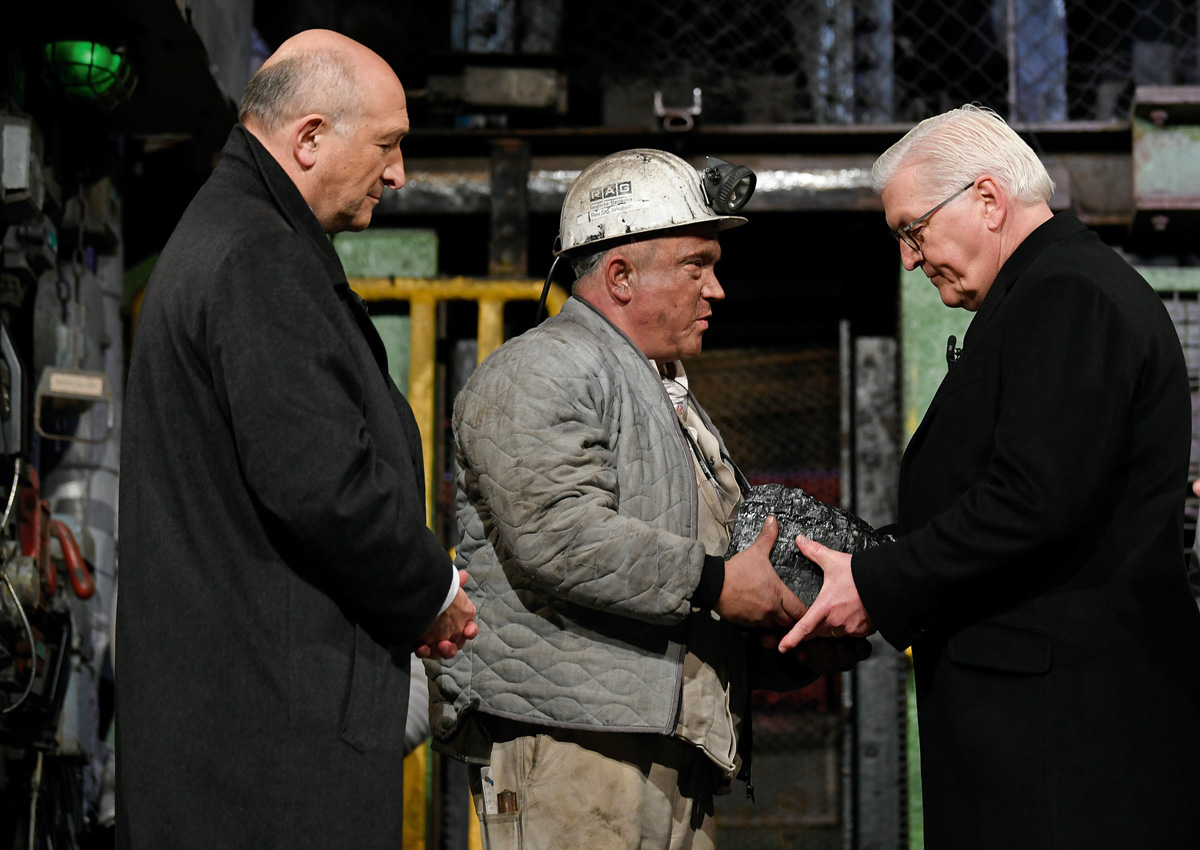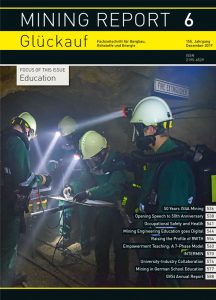Just over a year ago Mining Report Glückauf carried out a review of mining engineering studies in Germany, which included examining the conditions and prospects for mining students, the type of courses currently available and the various initiatives and projects being carried out at the mining universities. This latest issue of Mining Report Glückauf will be looking into this subject in greater detail and at the same time will peer over the fence, as it were, to see what others are doing in this field.
The onset of the digital age means a fresh set of challenges for our colleges and universities and today’s mining engineering courses have to take account of this fact. Four examples that have been developed at Clausthal University of Technology provide answers to the question of how curricula and courses for mining students can be structured for the future and successfully implemented. RWTH Aachen University has also devised new concepts for its Bachelor’s and Master’s Degree courses that will focus on teaching sustainable strategies for raw materials and energy and provide a basis for research in these thematic areas. The transfer of international know-how is fundamental …Read more
With my best regards // Mit freundlichem Glückauf
Dipl.-Ing. Andreas-Peter Sitte
Chief Editor Mining Report Glückauf, Essen
Modern Mining Engineering Education Transforming Towards the Digital Era
During the last decades, a transformation in various fields influencing education can be observed: Learning habits change, e. g., due to substantial changes in the channels and media used to acquire information. Teaching alternatives become broader and digital and follow these changes. Graduated profiles need to address 21st century skills for the work beyond the 4th industrial revolution.The transformation and its effects need to be implemented as well in a modern mining engineering education overcoming the deriving challenges and benefitting from the opportunities. Hence, the question that needs to be raised is how to design and implement functional curricula …
Authors: Angela Binder, M. Sc., Dipl.-Ing. Alexander Hutwalker, Prof. Dr.-Ing. Oliver Langefeld, Institut für Bergbau, Technische Universität (TU) Clausthal, Clausthal-Zellerfeld/Germany
Read moreRWTH Aachen University – Raising the Profile of the University’s Degree Courses on Energy and Natural Resources

Fig. 1. The Faculty of Energy and Natural Resources at RWTH Aachen University has adapted itself to changing social and technological demands. // Bild 1. Der Fachbereich Rohstoffe und Energie an der RWTH Aachen hat sich an die gesellschaftlichen und technischen Erfordernisse angepasst. Source/Quelle: FRE
Author: Sabine Backus, M. A., Fachgruppe für Rohstoffe und Entsorgungstechnik (FRE), RWTH Aachen University, Aachen/Germany
Read moreEmpowerment Teaching: A 7-Phase Model to Secure an Effective International Know-How Transfer in Engineering Education
International know-how transfer is the basis for reaching scientific excellence jointly all around the world. But: How can we transfer our know-how effectively from country A to country B? What are the prerequisites especially in applied sciences like engineering?Having given numerous lectures around the world during the last 15 years, the authors are convinced that participatory teaching methods can be an ideal answer to this question. The main aim is to empower the learner to meet the challenges of the future in theory and in practice. Participatory teaching methods enable the learner to develop knowledge, skills and attitudes. They are very useful to overcome cultural barriers between the lecturer and their students. This can create a win-win situation …
Authors: Prof. Dr. Jürgen Kretschmann, Prof. Dr. Ludger Rattmann, Technische Hochschule Georg Agricola (THGA), Bochum/Germany
Read moreIntroduction to the EU H2020-Project International Network of Raw Materials Training Centres (Intermin)
The H2020-Project INTERMIN commenced in February 2018. Its goal is to create a feasible, long-lasting international network of technical and vocational training centres for mineral raw materials’ professionals. Specific objectives of the project are to develop common metrics and reference points for quality assurance and recognition of training and to create a comprehensive competency model for employment across the primary and secondary raw materials sector. INTERMIN is also introducing an international qualification framework for technical and vocational training programs. This is based on present and future requirements by employers, to facilitate joint international training programs and to optimize future interaction and collaboration in Europe and internationally.This paper introduces the goals and objectives of INTERMIN. Furthermore, it highlights the benefits of the project to future students, professionals and academia and presents ways to contribute and interact with this project. It has undergone a peer review process.
Authors: Dr. Philipp Hartlieb, Montanuniversität Leoben, Leoben/Austria, Luis Jordá Bordehore, PhD, Universidad Politécnica de Madrid (UPM), Madrid/Spain, Dr. Vitor Correia, European Federation of Geologists, Brussels/Belgium, Prof. Manuel Regueiro, Geological Survey of Spain, Madrid/Spain, Dr. Jelena Vidovic, Eurogeosurveys, Brussels/Belgium, Dr. Boris I. Malyuk, PhD, Geoinform, Kyiv/Ukraine
Read moreAn Example of a University-Industry Collaboration to Undertake Focused Research
The School of Mining Engineering (Wits Mining) at the University of the Witwatersrand (Wits), Johannesburg/South Africa, has a long history of Mining Engineering education, being the oldest and largest on the African continent. Wits Mining has signed a Memorandum of Agreement with one of the largest gold mining companies in the world with a common commitment to education, research and innovation in South Africa. Both parties agreed to further research and develop the field of mechanised mining and rock engineering. This paper reflects on the process that was undertaken for this and the procedure in place for the success of this collaboration. It has undergone a peer review process.Authors: Rudrajit Mitra and Bekir Genc, School of Mining Engineering, University of the Witwatersrand, Johannesburg/South Africa
Read moreMining in German School Education – Status and Developments
In fact, schools are not enviable – a large number of studies indicates a continuous criticism. The comments range i. e. from a poor performance in basic subjects such as mathematics to an inadequate preparation of school leavers for vocational training and suitability for STEM-subjects. Thus, this article follows a further examination of the school-based approach. The central question which is focussed now is what is intended for mining in basic education. Due to the fact that all 16 federal states in Germany have their own curricular, they all were analysed concerning differences and similarities. This investigation is part of a PhD thesis at the TU Bergakademie Freiberg, Freiberg/Germany, on the public awareness of raw materials.Authors: Dipl.- Geoökol. Kirstin Kleeberg, Prof. Prof. e. h. Dr.-Ing. Dr. h. c. mult. Carsten Drebenstedt, Technische Universität (TU) Bergakademie Freiberg, Freiberg/Germany
Read moreGVSt 2019 – Annual Report

Fig. 1. The farewell ceremony in Bottrop: RAG Chairman Peter Schrimpf (left) and District Overman Jürgen Jakubeit perform the hand-over of the last lump of coal to German President Frank-Walter Steinmeier. // Bild 1. Abschiedsveranstaltung in Bottrop: RAG-Vorstandsvorsitzender Peter Schrimpf (li.) und Reviersteiger Jürgen Jakubeit übergaben das letzte Kohlestück an Bundespräsident Frank-Walter Steinmeier. Photo/Foto: Ina Fassbender
Authors: RA Michael Weberink, Dipl.-Ökonom Dr. Kai van de Loo, Gesamtverband Steinkohle e. V., Essen/Germany
Read more



















